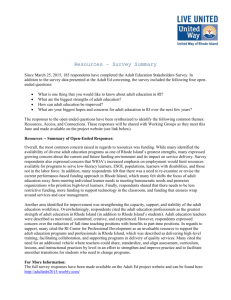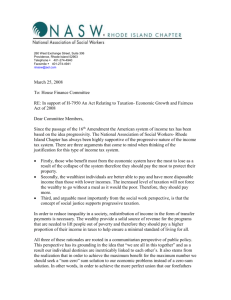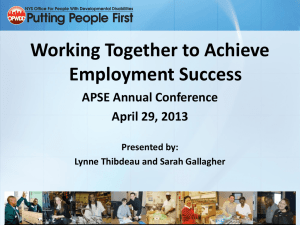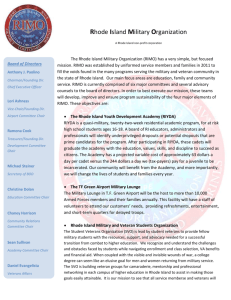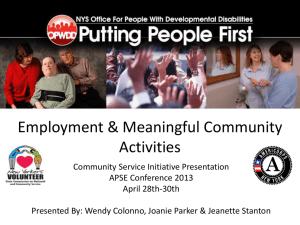Power Point Template 2
advertisement
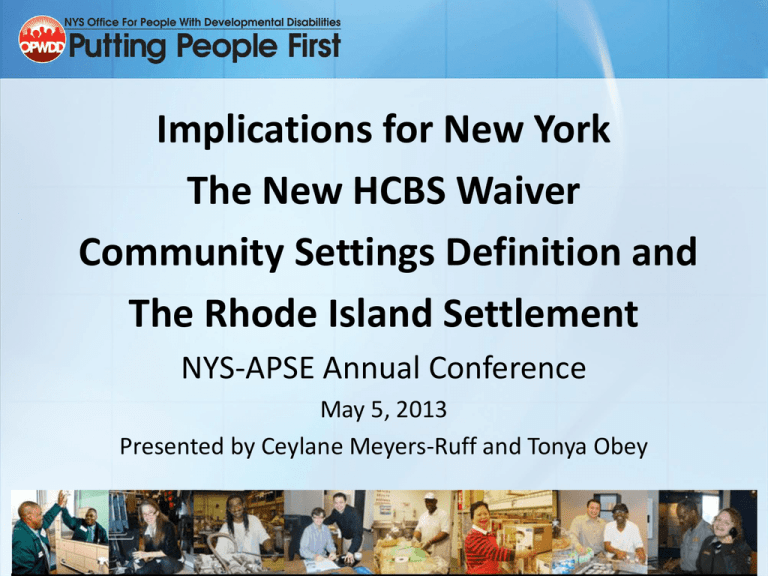
Implications for New York The New HCBS Waiver Community Settings Definition and The Rhode Island Settlement NYS-APSE Annual Conference May 5, 2013 Presented by Ceylane Meyers-Ruff and Tonya Obey Today IS NOT • A typical presentation about OPWDD employment policy • Just an update on the new CMS Regulation and Rhode Island Settlement IS • Opportunity to think about the implications of 2 significant federal policies • Opportunity to have a discussion about how these national trends could impact the future of DD services • Brainstorm ways to prepare for possible changes in the future 2 CMS Home and Community Based Setting Requirements A Home and Community Based Setting: • Is integrated in and supports access to the greater community • Provides opportunities to seek employment and work in competitive integrated settings, engage in community life, and control personal resources • Ensures the individual receives services in the community to the same degree of access as individuals not receiving Medicaid home and community based services 3 Settings PRESUMED NOT to be Home and Community Based • Settings in a publicly or privately owned facility providing inpatient treatment • Settings on grounds of, or adjacent to, a public institution • Settings with the effect of isolating individuals from the broader community of individuals not receiving Medicaid HCBS services 4 Timeline January 2014- Final Regulation Released March 2014- Final Regulation Took Effect April 2014 – Present • Awaiting CMS guidance on the impact on day services • CMS guidance will shape OPWDD guidance • Now is the time to start thinking about the possible implications of the regulation 5 Implications of HCBS Community Settings Definition 1. What does this mean for employment placements and how we currently define competitive employment ? 2. How should this impact the way we think about prevocational services? 3. What could this potentially mean for day hab? 4. What do we need to start doing differently today in order to prepare ourselves for the future? 6 Dept of Justice and Rhode Island Settlement 1. Consent Decree covering 3,250 individuals with DD over 10 years 2. Supported employment placement for 2,000 individuals including: At least 700 people currently in workshops; At least 950 people currently in facility-based nonwork programs Approx 300-350 students leaving high school Transition services for 1,250 youth ages 14-21 7 Rhode Island Dept of Education • Adopt an Employment First Policy • Implement school to work transition planning with specific timelines and benchmarks for youth age 14-21 • Including: integrated vocational and situational assessments, trial work experiences and other services 8 Supported Employment Requirements Supported employment placements must be in integrated employment settings where people: • Are paid at least minimum wage, • Work the maximum number of hours consistent with their abilities and preferences, and • Interact with peers without disabilities to the fullest extent possible. 9 Work Hours As a group (not individually), persons receiving supported employment placements under the consent decree will average 20 hours of work per week in integrated employment settings. 10 Non Work Activities All persons receiving supported employment placements will also be provided with integrated non-work services, ensuring that individuals have access to integrated work and non-work hours for a total 40 hours per week. 11 Maintaining Site Based Day Hab To ensure informed choice, individuals with I/DD may remain in segregated programs if they request a variance after they have received a vocational assessment, a trial work experience, outreach information and benefits counseling. • Does this only apply to day hab? 12 Other Components of the Agreement 1. Outreach, Education and Support to the benefits of supported employment 2. Creation of an Employment First Task Force comprised of stakeholders 3. Creation of a Workshop Conversion Institute to assist providers in converting to SEMP services ($800,000 for start up costs and TA training assistance for providers 4. MOU between DD, Education and VR agencies 5. Reallocation of workshop funding to SEMP and integrated day services (money follows the person w/o increased cost) 6. Funding must include transportation and adequate job coaching supports (including none face to face activities) 7. Quality Assurance and Data Collection Implications of Rhode Island Settlement 1. 2. 3. 4. What does this mean for employment placements? What does this mean for prevocational services? What could this potentially mean for day hab? What do we need to start doing differently now to prepare ourselves for the future? 14 Contact Information • Ceylane Meyers-Ruff ceylane.meyersruff@opwdd.ny.gov Tonya Obey Tonyamaree.obey@opwdd.ny.gov 15


